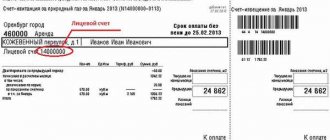Money for utilities: when current payments will go towards debt
SevernyByt LLC, a management company, has calculated that the owner of the apartment, Denis Kazhakhin*, has accumulated 2.2 million rubles. debt for utilities and 92,940 rubles. penalties for 2016–2019, and went to court. The defendant did not admit the claim. He indicated that he made payments regularly and provided supporting documents for these years.
In court, it turned out that Kazhakhin had a utility debt back in 2014. When he paid money for housing and communal services, the manager credited it to payment for services for the period in which the debts were incurred. Thus, according to the company, Kazhakhin was paying off the debt for previous periods, but increasing it for current payments.
The Norilsk City Court of the Krasnoyarsk Territory noted: there is no agreement between the parties on determining the periods and procedure for distributing amounts for housing and communal services. Consequently, these payments should have been received to repay previously accumulated debt according to the order of its formation. Therefore, the court partially granted the claim. At the same time, he collected only 40,000 rubles from Kazhakhin. penalties, considering that such a penalty is proportionate to the violation. The Krasnoyarsk Regional Court confirmed the legality of this decision.
The Supreme Court had a different opinion. He recalled: if the payment document does not contain data on the billing period, the money deposited on its basis is counted towards payment of housing and communal services for the period specified by the citizen (Article 3191 of the Civil Code). Kazhakhin wrote a specific period on the receipt. Therefore, the Supreme Court canceled the previously adopted acts and sent the case for a new trial to the court of first instance (No. 53-KG20-2). There the company abandoned the claim because there was no debt. The court accepted this refusal.
Payments are made only for the specified period
According to a lawyer from the Dispute Resolution practice of the law firm Intellectual Capital Intellectual Capital Federal Rating. Group Intellectual Property (Protection of Rights and Litigation) Group Intellectual Property (Registration) Group Arbitration Proceedings (medium and small disputes - mid market) Victoria Velyuga, payments for the specified period cannot be distributed at your discretion. “In such cases, the purpose of the payment is key. If the purpose of payment contains an indication of the payable period, then such payments are credited to the account of this period (clause 67 of the Rules for the provision of utility services). If the document does not contain data on the billing period, then under Art. 319.1 of the Civil Code, payments can be counted towards repayment of the resulting debt,” said Stanislav Cherny, a member of the Russian Lawyers’ Association. He reported that the courts had already made similar decisions (No. 2-1649/2016; No. 2-854/2014). Advisor to KA Muranov, Chernyakov and partners Muranov, Chernyakov and partners Federal rating. group Arbitration proceedings (medium and small disputes - mid market) group Bankruptcy (including disputes) (mid market) Olga Benedskaya drew attention to the fact that this position is contained in clause 3 of Art. 199 Civil Code, Art. 319.1 of the Civil Code, Resolution of the Plenum of the Supreme Court of June 27, 2017 No. 22.
Senior Consultant, Department of Legal Practice, Alliance Legal Consulting Group Alliance Legal Consulting Group Regional rating. group Arbitration proceedings (major disputes - high market) group Tax consulting and disputes group Dispute resolution in courts of general jurisdiction group Bankruptcy (including disputes) Company profile Yuno Sizykh recalled: the limitation period for collecting debts for payment for housing and utilities is calculated separately according to each monthly payment (part 1 of article 155 of the Housing Code, clause 2 of article 200 of the Civil Code). “Therefore, the court had to establish specific dates for payments and the amount of amounts paid in order to calculate the statute of limitations for each monthly payment,” says Sizykh.
The Armed Forces managed to maintain a balance of interests of citizens and management organizations. On the one hand, managers can set off money within the limitation period. On the other hand, they are deprived of the opportunity to freely interpret the will of the consumer.
Nikita Filippov, head of the De Jure Lawyers Bureau
* – first and last names have been changed by the editors.
- Alina Mikhailova
- Supreme Court of the Russian Federation
Collection of debts for housing and communal services by obtaining a court order
One of the ways to collect debt for housing and communal services is to obtain a court order from a magistrate. This procedure is prescribed in Chapter 11 of the Civil Procedure Code of the Russian Federation, which is called “Court Order”.
Thus, in accordance with Article 121 of the Code of Civil Procedure of the Russian Federation, a court order is a court decision issued by a single judge on the basis of an application for the collection of sums of money or for the recovery of movable property from the debtor according to the requirements provided for in Article 122 of the Code of Civil Procedure of the Russian Federation, if the amount of money to be recovered is or the value of the movable property subject to claim does not exceed five hundred thousand rubles. A court order is at the same time an executive document and is executed in the manner established for the execution of court decisions.
Those. a court order is issued by a judge alone, without holding a court hearing, without inviting the plaintiff and defendant, if the claim does not exceed 500,000 rubles. A court order (in other words, a judge’s decision in this case) is also a writ of execution, which can be directly sent for collection to the bank or bailiffs. These are the main differences between writ proceedings and ordinary (claim) proceedings in a district court of general jurisdiction:
— amount up to 500,000 rub.
- proceedings in absentia
— there is no need to obtain a writ of execution.
In addition, the amount of the state fee for consideration of a case by a magistrate court in the order of writ proceedings is significantly less than the state fee for consideration of a case by a court of general jurisdiction.
The requirements for which a magistrate is competent to issue court orders are set out in Article 122 of the Code of Civil Procedure of the Russian Federation:
— the claim is based on a notarized transaction;
- the claim is based on a transaction concluded in simple written form;
- the claim is based on the notary’s protest of the bill of exchange for non-payment, non-acceptance and undated acceptance;
- a claim has been made for the collection of alimony for minor children, not related to establishing paternity, challenging paternity (maternity) or the need to involve other interested parties;
— a demand was made to collect arrears from citizens on taxes, fees and other obligatory payments;
- a demand has been made for the recovery of accrued but not paid wages to the employee;
- the internal affairs body has filed a demand for the recovery of expenses incurred in connection with the search for the defendant, or the debtor, or a child taken from the debtor by court decision.
Those. These are requirements of the so-called indisputable order, for legal relations in which a person (usually the debtor) is obliged by law to perform any actions: pay taxes, alimony, pay fees for housing and communal services on time, fulfill the terms of the transaction, pay wages.
That is why the judge considers the case in absentia, without invitation or debate between the parties - in cases of writ proceedings there is no dispute, but there is an obligation imposed by law that is not fulfilled.
An application for a court order is submitted to the magistrate’s court at the place of residence (registration) of the debtor. According to Article 124 of the Code of Civil Procedure of the Russian Federation, the application is submitted in writing. The application for a court order must indicate:
1) the name of the court to which the application is submitted;
2) the name of the claimant, his place of residence or location;
3) information about the debtor: for a citizen-debtor - last name, first name, patronymic (if any) and place of residence, as well as date and place of birth, place of work (if known) and one of the identifiers (insurance number of an individual personal account, identification taxpayer number, series and number of an identity document, main state registration number of an individual entrepreneur, series and number of a driver's license, series and number of a vehicle registration certificate), for the debtor organization - name and address, as well as taxpayer identification number and main state registration number, if known. In the application of the citizen-collector, one of the identifiers of the citizen-debtor is indicated if it is known to the citizen-collector;
4) the claimant’s claim and the circumstances on which it is based;
5) documents confirming the validity of the claimant’s claim;
6) list of attached documents.
In the case of a claim for movable property, the application must indicate the value of this property.
3. An application for a court order is signed by the claimant or his representative having the appropriate authority. The application submitted by the representative must be accompanied by a document certifying his authority.
Clause 3 in Art. 123 was prescribed so strictly by the legislator relatively recently and came into force in April 2021. Previously, it was enough to indicate only the date and place of birth of the debtor. This amendment to the legislation caused a great resonance, especially among organizations managing apartment buildings, since the latter often do not have this information. Currently, the Government of the Russian Federation is developing a mechanism for management companies to obtain the specified information about debtors. Meanwhile, the Ministry of Construction of the Russian Federation sent to the Government of the Russian Federation an initiative to exempt Management companies from the obligation to indicate debtor identifiers when applying to the courts, if the organization does not have such information, and also to develop a system for Management companies to obtain personal data of debtors through the GIS housing and communal services using unique unified personal accounts of citizens .
In order to deal with this unpleasant situation for management companies, deputies of the State Duma adopted in the first reading Draft Law No. 735817-7 “On Amendments to the Civil Procedure Code of the Russian Federation and Article 13 of the Federal Law “On Enforcement Proceedings”” (in part of providing information about consumers of housing and communal services). In the bill, deputies propose to expand the types of identifiers for filing applications in court, issuing judicial acts and implementing court decisions by adding the number of a single personal account assigned to the State Information System for Housing and Communal Services.
As a rule, at the moment, when drawing up a Unified Housing Document for a debtor when filing an application for a court order, it is possible to find out the debtor’s passport information, since this information was submitted by him earlier and is contained in the UZhD,
The necessary documents that the plaintiff (management company) attaches to the application for issuance of a court order are:
— Payment order for payment of state duty
— Unified housing document
— Certificate of financial status of the personal account
— Extract from personal account about debts on rent and utilities
— Debt calculation
— Extract from the house register
— Copies of statutory documents (Charter, Certificate of state registration and tax registration)
— Copies of the Minutes of meetings of owners on the approval or change of tariffs for housing and communal services
— Copy of the Agreement with the State Committee for Civil Regulation and Situations, if necessary
— Copies of statements by number of debtors
— Power of attorney of the representative
All documents submitted in copies must be properly certified by the applicant. Documents on one sheet are certified by the seal of the organization, and signed by an authorized person with the note “Copy is correct.” Documents on several sheets are bound, numbered and also sealed with an authorized sheet in accordance with accepted standards.
The "UPRADOLG" program allows you to automatically generate all the necessary documents for collecting debts for housing and communal services using a court order, which significantly facilitates the work of a lawyer when it is necessary to work with a large number of debtors.
An application for the issuance of a court order can be submitted to the magistrate's court either in person or sent by mail. In case of personal submission of the application, you must have with you the original passport and document confirming your authority (usually the original power of attorney). If the application is sent by mail, the original power of attorney and a copy of the passport of the plaintiff’s representative must be attached to the set of documents.
In contrast to the arbitration process and cases expressly specified in the law, the debtor does not need to submit a pre-trial claim or in any way notify him of the intention to collect the amount of debt from him before filing it in the magistrate’s court. There is also no need to send him a copy of the application for the issuance of a court order - this is done by the court office and it is for these purposes that copies of it according to the number of debtors are attached to the application for the issuance of a court order. Some judges require the applicant, along with copies of the application for the issuance of a court order, to also attach to the set of documents copies of calculations of debt and penalties by the number of debtors for subsequent sending. Some, on the contrary, send only a copy of the plaintiff’s statement. In any case, attached copies of debt calculations for debtors will not be a mistake when filing an application, but their absence may slow down the progress of the case for some time.
The judge has the right to return the submitted application for a court order on the grounds specified in Articles 125 and 135 of the Code of Civil Procedure of the Russian Federation. These grounds, among others, are:
- the case is not within the jurisdiction of this court of general jurisdiction or within the jurisdiction of the arbitration court;
- the claim was filed by an incapacitated person;
- the statement of claim is not signed or the statement of claim is signed and filed by a person who does not have the authority to sign it and present it to the court;
- in the proceedings of this or another court or arbitration tribunal there is a case regarding a dispute between the same parties, about the same subject and on the same grounds;
- before the court issued a ruling on accepting the statement of claim for court proceedings, the plaintiff received an application for the return of the statement of claim;
- the circumstances that served as the basis for leaving the statement of claim without progress have not been eliminated within the period established in the court ruling.
— documents confirming the stated claim have not been submitted;
— the stated claim has not been paid with state duty;
- the requirements for the form and content of the application for a court order, established by Article 124 of this Code, have not been met.
- a claim is made that is not provided for in Article 122 of this Code;
— the place of residence or location of the debtor is outside the Russian Federation;
— from the application and the documents presented, it is clear that there is a dispute about the right.
The return of an application for a court order is not an obstacle to the claimant returning to court with an application to the same debtor, with the same demand and on the same grounds, after the violation has been eliminated. The judge shall issue a ruling on the return of the application for a court order or on the refusal to accept it within three days from the date of receipt of the application by the court.
In addition, the court may refuse to accept an application for issuing a court order on the grounds set out in Article 134 of the Code of Civil Procedure of the Russian Federation, namely:
the application is subject to consideration in constitutional or criminal proceedings, proceedings in cases of administrative offenses, or is not subject to consideration in the courts; the application was submitted in defense of the rights, freedoms or legitimate interests of another person by a state body, local government body, organization or citizen who is not granted such a right by this Code or other federal laws; in an application submitted on one’s own behalf, acts are contested that do not affect the rights, freedoms or legitimate interests of the applicant;
2) there is a court decision that has entered into legal force on a dispute between the same parties, on the same subject and on the same grounds, or a court ruling to terminate the proceedings in connection with the acceptance of the plaintiff’s refusal of the claim or the approval of a settlement agreement between the parties;
3) there is a decision of the arbitration tribunal that has become binding on the parties and was adopted on a dispute between the same parties, on the same subject and on the same grounds, with the exception of cases where the court refused to issue a writ of execution for the forced execution of the arbitration tribunal’s decision.
The judge issues a reasoned ruling regarding the refusal to accept the statement of claim, which must be handed or sent to the applicant, together with the statement and all documents attached to it, within five days from the date of receipt of the statement of claim.
In this case, the refusal to accept the statement of claim prevents the applicant from re-applying to the court with a claim against the same defendant, on the same subject and on the same grounds. A private complaint may be filed against the judge’s decision to refuse to accept the application.
In accordance with Article 126 of the Code of Civil Procedure of the Russian Federation, a court order is issued within five days from the date of receipt of an application for a court order to the court. As mentioned earlier, a court order is issued without summoning the claimant and debtor and conducting a trial. The court makes a decision and issues a court order “on the basis of the documents presented” - paragraph 3 of Article 126 of the Code of Civil Procedure of the Russian Federation.
In practice, as a rule, judges, despite the enormous workload, try to comply with these deadlines. As a rule, information about the judge’s issuance of a court order on an application is promptly posted on the websites of magistrates’ courts. In addition, this information can always be clarified with the secretary of the court district. Therefore, if after five days the result of consideration of the application is not published on the magistrate’s court website, most likely the application was returned by the judge to correct any inaccuracies. The relevant Determination of the magistrate will indicate the points that need to be corrected, after which you can apply for the issuance of a court order again. There is no need to pay the state fee again.
The application for a court order returned by the judge is sent to the applicant by mail, if he does not promptly appear and pick it up in person.
If the court has issued a court order and satisfied the applicant's demands, the court office sends the adopted court order to the debtor by mail. As Article 128 of the Code of Civil Procedure of the Russian Federation states, the judge, within five days from the date of issuance of the court order, sends a copy of the court order to the debtor, who, within ten days from the date of receipt of the order, has the right to submit objections regarding its execution. If the debtor’s objections regarding the execution of the court order are received within the established period, the judge cancels the court order. In the ruling on the cancellation of the court order, the judge explains to the claimant that the stated claim can be presented by him in the manner of claim proceedings. Copies of the court ruling to cancel the court order are sent to the parties no later than three days after the day it was issued (Article 129 of the Code of Civil Procedure of the Russian Federation).
If the debtor does not submit objections to the court within the prescribed period, the judge issues to the claimant a second copy of the court order, certified by the official seal of the court, to present it for execution. At the request of the claimant, a court order may be sent by the court for execution to a bailiff, including in the form of an electronic document signed by a judge with an enhanced qualified electronic signature in the manner established by the legislation of the Russian Federation (Article 130 of the Code of Civil Procedure of the Russian Federation).
In practice, from the moment the court order is issued until it enters into legal force, about 30 (thirty) days pass. This is due to the fact that the court office first waits 10 days from the moment the court order is sent by mail, and then another 20 days if the debtor does not receive the court order and returns it. Plus, it takes about ten days for the court office to directly produce the document itself with the signature of the judge and the official seal for the applicant. If there are several debtors indicated in the application for a court order and they are jointly and severally liable for the stated requirements, even at the stage of filing an application for a court order, it is necessary to ask the magistrate court to issue court orders according to the number of debtors. Thus, if a claim is made against three solidary debtors (for example, the owner and two members of his family), the court office issues three identical copies of the court order for each debtor. The applicant, at his own discretion, sends these documents to the bank or bailiffs.
Sample applications for issuing a court order are available in the Documents section
Step-by-step instructions for obtaining a court order to collect debts for housing and communal services are available here.
How does bankruptcy happen with housing and communal services debts?
To write off debts for housing and communal services in bankruptcy, you need to draw up an application for recognition of financial insolvency, prepare a set of documents and submit them for consideration. The court will consider the application and introduce bankruptcy proceedings.
Utility debts will be included in the register of creditors' claims and will be repaid after current payments. Even if the debtor does not have any property, the debt will be written off.
On average, the write-off procedure takes about 6-8 months, provided that the case is handled by an experienced lawyer.
Blog
Photo source: https://www.pexels.com/
In this article we will try to explain the general scheme and construction of algorithms for organizing work on debt collection, what are the nuances and difficulties in this seemingly relatively easy work and how to overcome them. This article is most relevant for young legal professionals and small institutions.
Many of you may have heard that work related to collecting debts for housing and communal services is relatively easy and does not require serious and analytical preparation. However, based on my experience when working with management companies, as well as TSN and HOA, we can identify the following difficulties that arise when organizing the work of collecting debt for housing and communal services, these are:
- lack of information about the exact amount of debt for housing and communal services;
- incorrect understanding and presentation of labor costs and difficulties arising in the work of lawyers in this area of activity of management organizations;
- lack of even an approximate plan for collection and work with enforcement proceedings.
Lack of information about the exact amount of debt for housing and communal services
Among those enterprises with whom I had the opportunity to work, the exact amount of debt for housing and communal services was not immediately disclosed. Many will say: there is a lot of work and such information is constantly changing. In our opinion, this information is very important and the management of the management company is obliged to constantly check and update it because These are, first of all, those amounts that are the income of the management facility, on which the quality of services, the purchase of material and technical resources, and the well-being of both residents and employees of the management facility directly depend. In addition, do not forget that the prosecutor's office of the Russian Federation, as a rule, once a year checks the work on collecting debts for housing and communal services in accordance with Article 22 of the Federal Law "On the Prosecutor's Office of the Russian Federation" and in the event of failure to provide information or lack of work on collecting debts for housing and communal services itself The UO may be brought to administrative liability under Art. 17.7 Code of Administrative Offenses of the Russian Federation.
Conclusion: the heads of management organizations need to constantly check the amounts of debt under the MKD that they service, and have at least an approximate collection plan, otherwise the management company may be subject to administrative punishment, and this is a serious blow to the company’s reputation.
Incorrect understanding and representation of the labor costs and difficulties that arise in the work of lawyers in this area of activity of management organizations.
There is an opinion among some management authorities that the work of collecting debts for housing and communal services is quite easy and does not require any special approach or preparation; it is enough to have one person for this area, and the collection process will go by itself. In our opinion, this is a serious misconception. Imagine a management company that owns not a large number of MKDs, say 10-20. In every house, as a rule, there are debtors, and you need to work not just with each house, but with each debtor individually. As a result, time and labor costs increase significantly. In addition to this work, there is also the parallel work of a lawyer in enforcement proceedings and filing claims against legal entities. Moreover, it should be understood that applications for the issuance of a court order or claims to legal entities, of course, although they help, there is still a percentage of those who fundamentally disagree with the payment of debts for housing and communal services, who appeal applications for the issuance of court orders; as a result, there is a need to file a claim in the magistrates' or city courts, which significantly slows down the work of collection, because the time and documentation for the courts for statements of claim for the collection of debts for housing and communal services is much greater than for similar statements in the order of writ proceedings. In small organizations, as well as TSN and HOA, lawyers often have legal service functions combined with secretarial activities and other administrative and business functions.
Just imagine the amount of work lawyers do, in principle, this includes preparing responses to citizens’ appeals, and participating in various trials to represent the interests of the company, coupled with administrative processes, and working with government bodies and organizations, creating local regulatory legal acts organizations and their verification of compliance with legislation, as well as work within the framework of inspections of government bodies, consultations with accounting departments, economic departments, human resources departments, other employees, managers, contractual work and plus debt collection for housing and communal services. It often happens that all of the above is combined by one person, even in larger management companies.
We believe that the above does not lead to anything positive, everything leads to destabilization of the lawyer’s work, excessive workload, fatigue and, as a result, routine, which makes it very difficult for the lawyer to allocate time specifically for debtors. In our opinion, it is possible to resolve these issues only by clearly planning the activity and its directions for the lawyer, as well as allocating one, or better yet, two specialists separately for debt collection, because The layer of this work is huge, primarily due to the fact that at the present time among many management companies there are simply huge amounts of receivables and one person is simply not physically able to do this work.
For example, in the article: “ Ministry of Construction: debt for housing and communal services in Russia has reached 1.3 trillion rubles
." published on the RIA website indicates that: “the total debt in the housing and communal services sector of Russia is not decreasing and currently amounts to about 1.3 trillion rubles, said the head of the Ministry of Construction of the Russian Federation, Vladimir Yakushev, at a meeting of Russian President Vladimir Putin with members of the government.
He clarified that the debt of the population of this amount is about 810 billion rubles, budgetary organizations - 60 billion rubles, other consumers owe 400 billion rubles."
As you can see, the current situation says that you need to be careful when working to collect debts for housing and communal services. In our opinion, for successful work in the direction of collecting debts for housing and communal services, it is necessary for the organization to have two employees:
- one of whom will be exclusively engaged in compiling a list of debtors, calling them, as well as collecting and preparing documents for issuing court orders with their subsequent transfer to the FSSP of the Russian Federation;
- the second will be involved in representing the interests of the company in magistrates', city, and district courts within the framework of debt collection proceedings.
We recommend dividing the work on enforcement proceedings between the above-mentioned employees, one of whom will conduct enforcement proceedings within the framework of court orders that have entered into force, and the other - the issued writs of execution.
Lack of even a rough plan for collection and work with enforcement proceedings
In organizing work on collection, in our opinion, without a plan and deadlines for its implementation, it is in principle impossible to advance, because otherwise, there will be red tape and a “mess” in the documentation for collection, which will lead to destabilization of the work on collecting debts for housing and communal services, and this, in fact, is a complete failure of the management company’s activities in terms of debt collection. To solve this problem, we offer our general approximate plan - instructions for organizing work on collecting debts for housing and communal services.
In our opinion, the general plan - instructions for collecting debts for housing and communal services is divided into 3 blocks:
- claims work with legal entities;
- claims work with owners/tenants of residential premises;
- enforcement proceedings.
Before we reveal what is included in each block, we believe that there is a serious need to determine the amount with which debt collection work can begin. After all, if you collect money regardless of the amount of debt and collect too small amounts, this will lead to a waste of time and labor costs. There are several starting points on this issue.
The first is an analogy of the law: we can take as a basis clause 118 of the Government of the Russian Federation of May 6, 2011 No. 354 “On the provision of utility services to owners and users of premises in apartment buildings and residential buildings,” which states that “under incomplete payment by the consumer utility service is understood to mean that the consumer has a debt to pay for 1 utility service in an amount exceeding the sum of 2 monthly fees for a utility service, calculated on the basis of the utility service consumption standard, regardless of the presence or absence of an individual or common (apartment) meter and tariff (price) for the corresponding type of utility resource, valid on the day of restriction of the provision of utility services, subject to the absence of a debt repayment agreement concluded by the consumer-debtor with the contractor and (or) in the event of failure by the consumer-debtor to comply with the terms of such an agreement.”
If the consumer does not fully pay for all types of utility services provided by the contractor to the consumer, then the contractor calculates the consumer's debt for each type of utility service separately. Simply put, the amount of debt is an amount that exceeds the amount of payment for housing and communal services by more than 2 times. However, if the debtor lives in “old” houses, for example, five-story buildings, where the amount of payment for housing and communal services is relatively small and does not exceed the minimum wage in the city or the average salary, then such a debt is not a reason for it to begin to be collected immediately in court. .To. it will be quite small.
The second point of view is determining the amount of debt for housing and communal services, based on the minimum wage in the region. This amount may already be more than 2 payments for housing and communal services, but it is still relatively small.
The third point of view is to determine the amount of debt for housing and communal services, based on the average salary in the city or region. We believe that this is the optimal amount, which is quite significant for starting work on debts for housing and communal services in full, including the judicial stage. This amount, a priori, indicates a possible willful defaulter.
Claim work with legal entities
We recommend dividing this block into two parts: work on collecting debts for housing and communal services with legal entities in terms of writ proceedings (for individual entrepreneurs and legal entities with a claim amount of up to 50 thousand rubles) and the general procedure for considering a dispute in the Arbitration Court (over 500 thousand rubles ).
Further, this block is generally divided into the following necessary stages:
- requesting and receiving a list of debtors from the accounting department;
- calling and analyzing debtors, determining a further plan for each;
- resolving the issue of concluding agreements;
- drawing up a claim against a list of debtors;
- sending claims by mail, by hand;
- compiling a register of submitted claims;
- tracking deadlines for delivery of claims, checking payment status;
- sending documents to the Arbitration Court for the issuance of enforcement orders or to initiate legal proceedings;
- checking the results of the court issuing executive orders and initiating Arbitration cases (after the initiation of court cases, sending the necessary arguments, petitions (for the arrest of accounts), objections to reviews, etc.;
- conducting legal proceedings, obtaining a court decision, an executive order, resolving the issue of appeal, sending enforcement documents to the FSSP of the Russian Federation.
Claim work with owners/tenants of residential premises
The algorithm for collecting housing and communal services debt from owners/tenants of residential premises is almost completely similar to collection from legal entities, with the exception of a mandatory claim. However, we ask you to pay attention to the identifiers (Article 131 of the Code of Civil Procedure of the Russian Federation), which the management authority may not have for the debtors. In this case, we recommend that you first look for them in the passport office, contracts and other documents. If any identifiers are missing, we recommend indicating their absence in the claim or application for the issuance of court orders. Here it is important to indicate in the operative part of the application that the court must indicate this identifier in its decision, because otherwise, such an executive document will not be accepted by the FSSP of the Russian Federation due to the lack of an identifier - clause a part 1 of article 13 of the Federal Law of October 2, 2007 N 229-FZ “On Enforcement Proceedings”.
Enforcement proceedings
In our opinion, work with enforcement proceedings is also divided into 2 blocks:
- checking and conducting existing enforcement proceedings;
- initiation and conduct of new enforcement proceedings.
Checking and maintaining existing enforcement proceedings
In this block we highlight the following elements:
- compiling a register of filed enforcement documents and forming cases for each of them;
- drawing up and sending applications to the departments of the FSSP of the Russian Federation to submit a report on the enforcement actions of bailiffs;
- receiving reports on enforcement actions, analyzing them, determining the need for personal acquaintance with those proceedings regarding which there are questions;
- determining the further plan of action after familiarization: this includes sending the necessary petitions, complaints, statements to bailiffs, the regional FSSP office, the prosecutor's office of the Russian Federation, and other government bodies;
- compiling a register of completed actions in enforcement proceedings;
- tracking the results and receiving responses to petitions, statements and complaints and determining further actions in enforcement proceedings.
Initiation and conduct of new enforcement proceedings
This block is divided into the following necessary actions:
- drawing up applications for the initiation of enforcement proceedings against legal entities and individuals. We recommend, if possible, that applications be grouped separately for each home;
- sending the above applications to the departments of the FSSP of the Russian Federation on purpose or via mail;
- compiling registers of submitted applications to initiate enforcement proceedings;
- obtaining orders to initiate enforcement proceedings;
- determination of deadlines for completion of enforcement proceedings, verification of payment for enforcement proceedings.
We also recommend that before the end of the collection period for enforcement proceedings for those debtors for whom collection has not been carried out, it is imperative that you familiarize yourself with the materials of the enforcement proceedings in person, by photographing them. Next, draw up the necessary petitions, complaints and submit them. It is mandatory to draw up a register of actions taken within the framework of enforcement proceedings. After which, track the decisions made based on the results of consideration of your complaints, applications and make decisions on the further fate of such enforcement proceedings.
To summarize, we also want to focus on the general work schedule for collecting debts for housing and communal services. We believe that we should take all debtors in one house as a basis and work on it, subsequently moving on to the next houses. The concept, if one person is working on collection, is that, conditionally, the first week should be allocated to preparing documents for the court, this includes compiling a register of debtors, calling debtors, concluding agreements, drawing up claims, necessary applications to the court. Be sure to set aside a day or half a day to check the documents you have compiled, even if they seem to be of the same type. This is a very important detail when working with documents, in principle, because the human factor cannot be canceled and anyone can make a mistake. Otherwise, we get a double situation when the employee seems to have filed a lot of applications to the court, but at the same time made a lot of technical errors and typos. Thus, in the person of the manager, he becomes an employee who makes too many mistakes. Regarding errors and technical typos, I would like to highlight to the management of the administrative organization that lawyers compile a huge amount of documents and mistakes always happen and, unfortunately, for everyone. Therefore, in order to enable specialists to collect a lot and effectively, either turn a blind eye to errors that are not significant, such as typos or misspellings in words, or give a day to check and edit documents before sending them. We consider it important to devote the second week solely to preparing the position, drawing up the necessary documents for pending claims for collection of debts for housing and communal services in the courts. The third week, in our opinion, can be allocated for enforcement proceedings. We recommend dedicating the fourth week to summing up the work done, receiving responses to applications, petitions, complaints and working with them, drawing up plans for further collection.
In conclusion, we would like to note that we have covered only the general part of the collection work and there are still many nuances and subtleties, however, we cannot cover everything in one article - it will be too voluminous. We have given only an approximate plan of action for collecting debts on housing and communal services for educational institutions, and for each educational institution such plan-instructions will, of course, be different and vary significantly. We hope that this information will help you better understand the issues that arise when working to collect debts on housing and communal services debts, and successfully resolve them.
Sincerely,
Head of the legal agency "DART" Glebov N.V.
Nizhnevartovsk
What you need to know if you decide to go bankrupt with utility debts
The first thing you need to decide on is how to write off debts. An individual who does not pay utility bills can go bankrupt in different ways:
Through the arbitration court
To do this, an application for recognition of financial insolvency is submitted, based on the results of which a debt restructuring or sale of property is introduced. If you do not have a stable and sufficient income that will help restore solvency, we recommend that you immediately proceed to the sale of property.
It is convenient that you can go to court for any amount of debt, but if it exceeds 500,000 rubles, then this is no longer a right, but an obligation of a citizen. Otherwise, the creditors themselves, including the management company to which the debt arose, can apply to the court.
Through MFC
Bankruptcy in case of debts for housing and communal services through multifunctional centers is carried out differently. Firstly, this method is used only if the non-payment ranges from 50 to 500 thousand rubles. Secondly, enforcement proceedings should be closed against the defaulter due to the lack of property that could be sold.
This limitation makes bankruptcy through the MFC more difficult than through a standard court procedure. It turns out that this is only possible if the management company or another creditor goes to court, receives a decision or order, but is unable to receive the money due to the debtor’s lack of property.
Is it true that housing and communal services debts can be written off through bankruptcy?
Anyone who finds themselves in a difficult financial situation and does not know how to proceed can have their housing and communal services debts written off through bankruptcy. Unfortunately, management companies do not write off debts. If you don't pay, sooner or later they will go to court.
On a note!
We do not recommend taking out loans, and especially loans from microfinance organizations, in order to repay debts to the management company. This will only worsen your already difficult financial situation.
Debts are written off through bankruptcy:
- for utilities
- loans and mortgages
- loans from microfinance organizations
- on promissory notes
- taxes and fees
- traffic police fines
- other financial obligations, with the exception of current payments, alimony and compensation awarded in case of harm to the health or life of third parties
Exclusively for residents of St. Petersburg and the Leningrad region of St. Petersburg and Leningrad Region
from
When is notification sent?
Apartment owners who have become defaulters must receive a notice specifying the amount and deadline for full repayment of the entire debt. This is an official document in which a claim is made against the debtor or certain information is sent. The notification comes after the first month of delay.
The notification must indicate the calculation of the debt and the accrued penalty. In this case, the recipient of the notification must note that penalties should be accrued from the second and subsequent months of delay.
When a utility company sends a debt collection letter, he states that he intends to collect the debt in accordance with the service agreement that was concluded between him and the owner of the property. A month after the debts are repaid, the housing organization or other housing and communal services provider sends another notice to the apartment owner, informing them of the repayment of the debt.
Letter of demand for payment of debt
A letter of demand for payment of debt, a sample of which is attached just below, can serve as the beginning of a constructive dialogue in business correspondence. The document is generated quickly, in compliance with the norms accepted in business correspondence. Through this letter (also called a letter of claim), the counterparty pushes its business partner to pay the existing debt.
If we approach it from a legal point of view, then this letter, correctly drawn up, certified and registered, will be additional strong evidence in favor of the existence of the debt as such. This will be required in case of possible appeal to the courts.
What needs to be done to write off housing and communal services debt?
Bankruptcy for housing and communal services and other debts (for example, for loans and traffic police fines) allows you to start your financial life with a clean slate: all debts that have accumulated due to non-payment of utilities will be written off:
- cold and hot water supply
- heating
- gas
- domestic gas in cylinders
- wastewater disposal (sewerage)
- garbage removal and others
To deal with debt obligations to the management company, seek legal help. This will help not only choose an effective bankruptcy option, but also properly prepare for the procedure.
Our lawyers will completely take care of the case of declaring your financial insolvency in court, including drawing up an application, collecting the necessary documents, interacting with the management company and other creditors, if any.
When the notification is sent
Warnings about overdue payments are sent to debtors almost immediately after non-payment. In some cases, defaulters can receive it the very next day.
A notice of the need to pay rent for utilities and major repairs is a measure that should encourage a person to pay off the cost of housing and communal services. At the same time, for each day of delay, the management company can charge a penalty - a penalty.
If a refund is not made within 3 months, the homeowner may have their electricity or other utility services cut off. It is also possible that a trial may begin.
In this case, the owner may be forced to collect payment. Moreover, in order to repay the claim funds, they can describe the property of the defaulter. If the apartment is not privatized, the tenant may lose it altogether.








